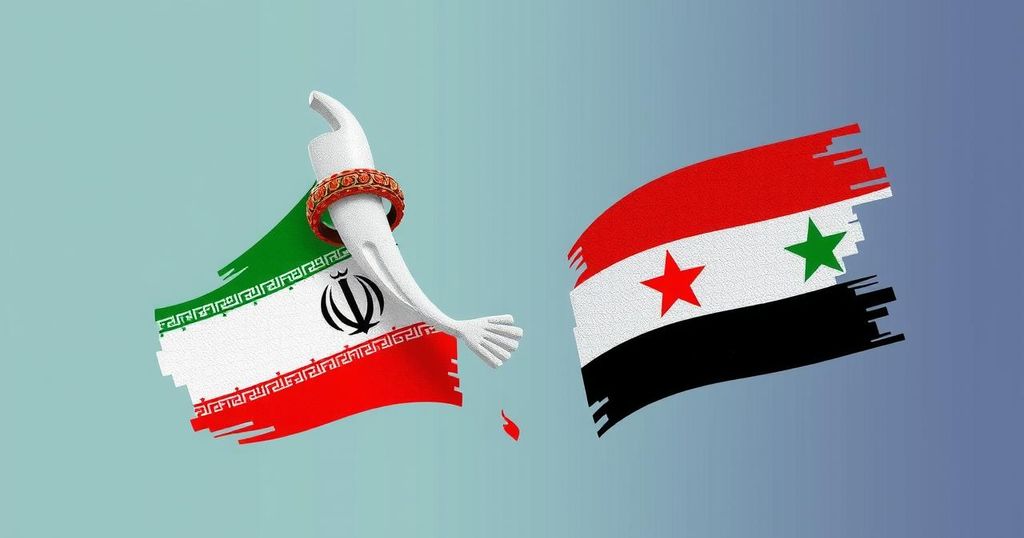The recent visit of Syrian Foreign Minister Bassam al-Sabbagh to Iran highlights the strengthening alliance between the two nations amid rising geopolitical tensions. Iran remains a staunch supporter of the Syrian regime, especially in light of changes in U.S. administration and escalating conflicts involving Israel. Both ministers underscored the importance of mutual cooperation, which includes addressing issues related to Gaza, Lebanon, and regional security dynamics.
Recently, Syrian Foreign Minister Bassam al-Sabbagh visited Iran, marking his first official trip since assuming office in September. While Iranian state media reported the meeting with Foreign Minister Abbas Araghchi, they initially offered limited details beyond mentioning discussions of various issues. However, it was clear that Iran reaffirmed its commitment to supporting the Syrian regime, particularly amidst shifting geopolitical dynamics with the new U.S. administration and escalating tensions surrounding Russia’s actions in Ukraine, which could significantly affect the region. Both nations are closely observing developments, particularly concerning Russian support for Syria, as evidenced by the recent trilateral talks held in Astana with Turkey. Reports indicate a potential normalization of relations between Turkey and the Syrian government; yet, such a move might encounter disapproval from Iran. The recent discussions between the two foreign ministers indicated a desire to enhance cooperation on mutual interests, including significant issues in Gaza and Lebanon, as well as Iran’s arms support to Hezbollah through Syria. Tensions along the Golan Heights, primarily attributed to Israel’s activities, have also heightened concerns. Post-meeting, Iranian officials condemned Israel’s actions, asserting that Iran’s strategy would prevent any aggression against its territory. Additionally, Iranian Foreign Minister Araghchi underscored the resilience of Iran against expected sanctions from the incoming U.S. administration, emphasizing the ineffectiveness of a pressure-oriented approach. This comes alongside Syrian denunciations of Israeli strikes against regional adversaries, which include direct references to military actions targeting Iranian diplomatic missions. Moreover, recent reports suggest Israel has proposed potential concessions regarding sanctions on President Bashar Assad in exchange for Syrian collaboration in curbing arms transfers to Hezbollah. Such negotiations underscore a complex interplay of alliances and regional power dynamics. As Iran continues to strengthen its position in Syria amidst these developments, it remains vigilant regarding evolving relations between Israel and Russia, as well as Turkey’s positioning of Hamas factions within its borders. In summary, the strengthening ties between Iran and Syria occur within a context of regional upheaval and realignment. Iran’s commitment to supporting Damascus amidst external pressures illustrates its strategic priorities, as both nations navigate the intricacies of international diplomacy.
The geopolitical landscape of the Middle East has been significantly altered by ongoing conflicts, especially those involving Syria and Iran. Historically, Iran has acted as a crucial ally of the Syrian regime, providing military and logistical support amid the Syrian civil war. The changing dynamics brought about by the new U.S. administration and Russia’s military involvement in Ukraine create an environment of uncertainty and potential recalibration of alliances among regional powers. Keeping this context in mind is essential to understanding the implications of the recent Iranian-Syrian discussions.
In conclusion, the meeting between Iranian and Syrian foreign ministers signifies a continuation of Iran’s unyielding support for Syria amidst shifting geopolitical tensions. As both nations strategize in response to external pressures from countries like the United States and Israel, their alliance becomes increasingly crucial in navigating the tumultuous landscape of the Middle East. The evolving relations with Turkey, Israel’s proposed negotiations with Assad, and the ongoing repercussions of Russia’s actions will undoubtedly shape future interactions within this complex web of alliances.
Original Source: www.jpost.com






